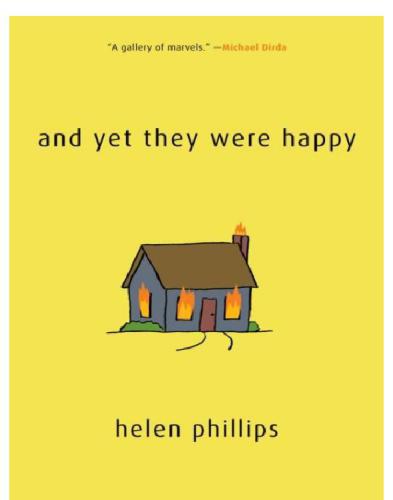
And Yet They Were Happy
LeapLit
- اطلاعات
- نقد و بررسی
- دیدگاه کاربران
نقد و بررسی

February 7, 2011
Milestones—emotional, familial, biblical—feature heavily in Phillips's imaginative debut. The stories are organized around themes—floods, fights, punishments, "the Helens"—and embark on marvelous flights of character and metaphor: in "flood #2" as the waters are rising, a despairing Noah walks into a bar, muttering, "I didn't get them all," while in "fight #2," a battling couple repeatedly take on bizarre transformations, he, for instance, into a rainstorm and she into a fire. The narrator of "fight #5" invites a statue of the Virgin Mary to a cup of tea, only to feel sharp disappointment at Mary's remarks regarding the narrator's emotional needs. The "far-flung family" episodes consist of an anecdote about ancestors building a covered wagon and heading west, and one about the king's daughter who has married "the clever yet dirty craftsman." "The envies" concerns the jealousy of two sisters of "The girls in Maxfield Parish paintings," while "mistake #5" compels the narrator to find Santa, only to be rebuffed by the bitter old man. Mothers, weddings, and monsters are all treated with irreverence in this cunning work that winks at reality as it carves out its niche deep in fable territory.

February 1, 2011
The story of the world unfolds in bursts of imagination, tied together with the flavor and thematic structure of fables.
The collection is made up entirely of two-page short stories, clumped together by theme. The first, "The Floods," introduces the end of the world by water, starting with a blowout party to which everyone's invited, and ending with a Snow Whiteinspired rumor that all the apples have been poisoned. "We hear of babies born with traces of twenty-seven poisons in their umbilical cords," Phillips writes. "We sit in the kitchen, eating nothing." It's a world where the original Eve and Noah stroll in deep conversation, where a bitchy Bob Dylan helps with the grocery shopping, where our narrator walks all the way to the North Pole to find its most famous resident, only to be insulted for her efforts. There's quite a lot of humor in these stories, although it's very dark comedy indeed. And there's a lovely bit of universality to certain sections, some of the best being themes that examine fights, failures, mistakes and punishments. In the middle, between "The Floods" and "The Apocalypses," Phillips dwells on the cycles of family with a section that shines a light on the journey from bride to mother to the raising of offspring. Others are disturbing, portraying hauntings, monsters and other fantasies in ways that have to be read, and not described. Phillips' unique worldview and clarity of language make every story a treat, be it miniature portraits of Anne Frank or Charlie Chaplin, or a sad instructional manual about how to rid oneself of all possessions.
A literary reflection to The Magnetic Fields' album 69 Love Songs.
(COPYRIGHT (2011) KIRKUS REVIEWS/NIELSEN BUSINESS MEDIA, INC. ALL RIGHTS RESERVED.)




دیدگاه کاربران